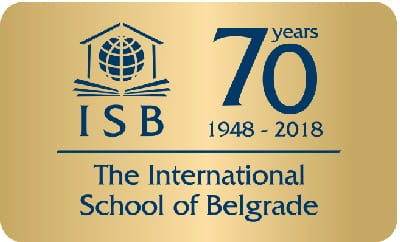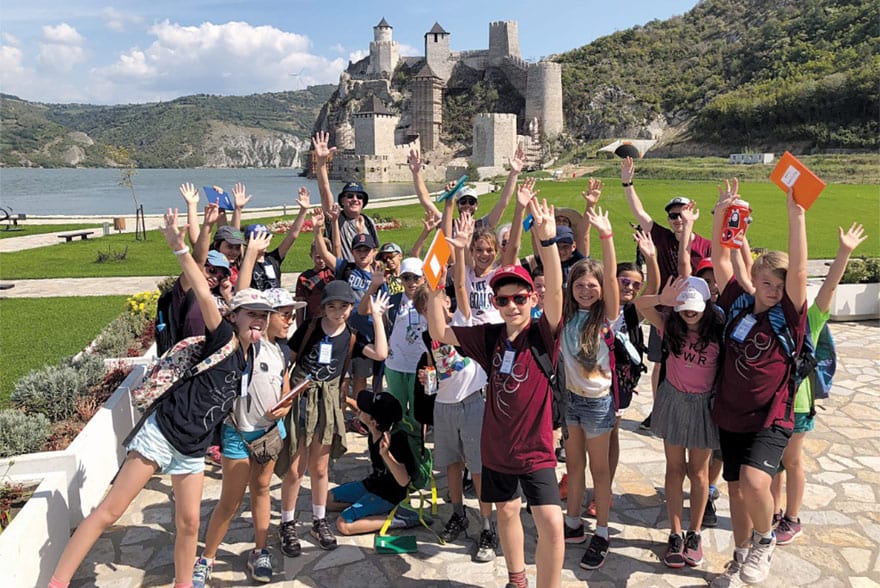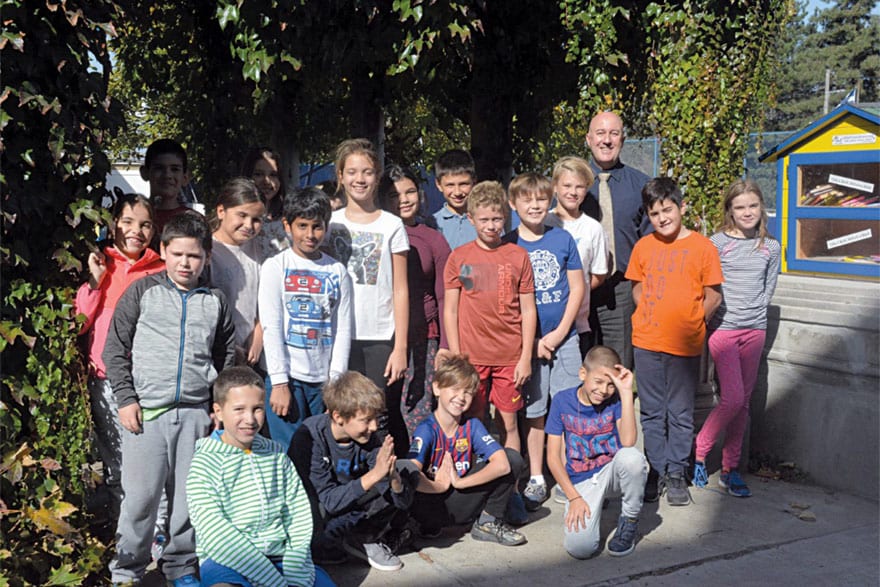Students nowadays have immediate access to information at their fingertips and can find facts with the push of a button. Our job as educators is to show them what to do with that knowledge.
 We need to give students the opportunities to work in groups with effective communication skills and to solve problems independently using creativity and critical thinking skills, notes Warren Bowers, Lower School Principal at the International School of Belgrade, speaking to CorD.
We need to give students the opportunities to work in groups with effective communication skills and to solve problems independently using creativity and critical thinking skills, notes Warren Bowers, Lower School Principal at the International School of Belgrade, speaking to CorD.
The International School of Belgrade (ISB) has been engaged in teaching foreign children in Belgrade since as far back as 1948. How do those seven decades look to you now, from today’s perspective?
The world we are preparing our students, for now, is completely different from that of 1948. Serbia itself has gone through more changes than most countries over that time and the fact that ISB has remained in action over the past 70 years is a testament to its resilience, its quality and its ability to grow with changing needs and expectations. The school has grown to become the top-quality, highly-respected international school that we have today thanks, in part, to the history and traditions of the past.
On top of being authorised by the International Baccalaureate Organization for many years to teach all three programmes of the IB, we are also accredited by the Council of International Schools (CIS) and the New England Association of Schools and Colleges (NEASC)
Some of the major achievements of which the school is particularly proud are the fact that ISB remained open throughout the period of the ex-Yugoslavia wars in the 1990s when most expats left the region. Additionally, gaining authorization to implement the three programmes of the International Baccalaureate (IB) was a natural and important outgrowth of the ISB commitment to educating globally-minded citizens who contribute positively to society. ISB became authorized by the International Baccalaureate Organization to offer the Diploma Programme, the Middle Years Programme, and the Primary Years Programme during the 2005-2007 years, and on May 2010, ISB was one of 583 International Baccalaureate World Schools to offer all three IB programmes.
What kind of education does the school represent and which standards does your curriculum adhere to?
The educational programme here at ISB is truly international. We have students from more than 40 different countries from all over the world and we highlight and celebrate the diversity they represent. The Lower School at ISB uses the Primary Years Programme (PYP) of the International Baccalaureate for the curriculum framework. On top of being authorised by the International Baccalaureate Organization for many years to teach all three programmes of the IB, we are also accredited by the Council of International Schools (CIS) and the New England Association of Schools and Colleges (NEASC). As well as this, we adhere to standards set by the Serbian Ministry of Education. All of these accreditations mean that our programmes are subject to external standards, are top quality and recognised internationally.

Our curriculum is described as transdisciplinary, with the curriculum areas intersecting and connecting and often being taught together. For example, if the students are learning about plants and other living things, they will be reading about this and their writing might look at the genre of a report. If students are learning about the impact that significant people have on us, their reading and writing might be biographies. We make learning interesting and exciting and students enjoy working this way. ISB has always focused on strong academics, and at the same time embraced teaching methodologies that enable students to gain the skills to be able to apply their knowledge, and to critically analyse issues from various perspectives.
Which age categories does the school cater for and are there any prerequisites for enrolling to study?
ISB as a whole school has students from Pre-Kindergarten to Grade 12. In the Lower School, our students finish at Grade 5 before moving to middle school for Grade 6. So our youngest students are 3 years old and our oldest primary students are 11 years old.
We have a Learning Support department that helps students who find aspects of the curriculum challenging and we provide additional English language classes to those who are new to English.
We have a Learning Support department that helps students who find aspects of the curriculum challenging and we provide additional English language classes to those who are new to English
We have entrance assessments in literacy and mathematics to determine the proficiency of our applicants in these two areas and set up the programs to successfully meet their needs.
What is the typical profile of the ISB teaching staff?
One of the great things about ISB is that we do not have a ‘typical profile’ for our teachers. We have teachers from many different parts of the world and from many different backgrounds. It is this diversity, and the diversity of our student body, that makes our school culturally rich. Many of our teachers have worked in different countries throughout their career and some of our teachers have a Serbian background but were raised in other countries. All of our teachers are fully qualified and experienced and many have a Masters degree. We have a very good reputation in the international schools’ community which makes ISB a sought-after place to work.
Having amassed a great deal of experience leading international schools around the world, how are your first impressions of Belgrade?
I am grateful every day to be living and working in such an interesting and beautiful city as Belgrade.

This is my fifth international school experience and I have to say that the transition to Belgrade has been second to none. The people have been extremely welcoming and friendly, especially my Serbian colleagues at ISB. I’m enjoying exploring the markets, with the incredible selection of fruit and vegetables, and discovering the various eating spots around the city. I like live music and am enjoying the local bands at various events. It’s only been three months since I moved here, but I’m already excited to call Belgrade home.
Apart from equipping them with knowledge, do you train the pupils with some other skills?
Students nowadays have immediate access to information at their fingertips and can find facts with the push of a button. Our job as educators is to show them what to do with that knowledge. We need to give them opportunities to work in groups with effective communication skills and to solve problems independently using creativity and critical thinking skills. It is vital for schools to create environments where students can try things out and make mistakes as part of their learning process. We need to teach our students to be resilient and flexible when things do not work out the way they want them to and to help them manage disappointment. Being open-minded and being able to see things from different perspectives is becoming more and more important in our swiftly changing world.